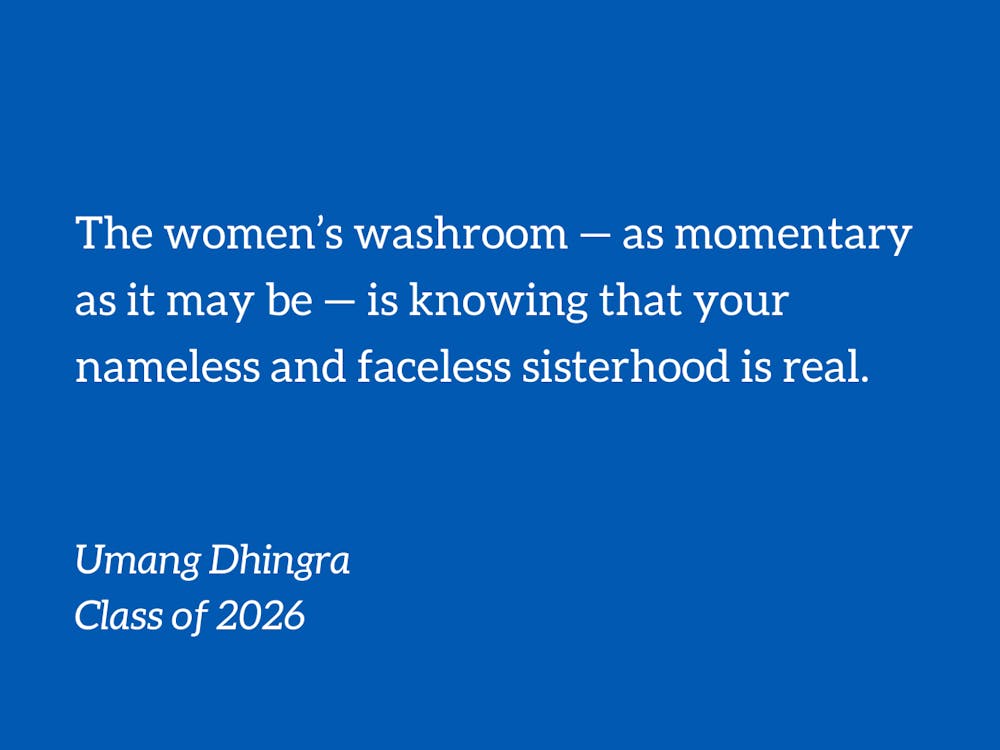For every line I wait in to buy a ticket to a concert, a play or a sporting event, I wait in a line profoundly longer when I am actually there to use the washrooms. There is massive inequity in the way men’s and the way women’s bathrooms are constructed, which is why women often experience significantly longer wait times in public places than men do. And while that is an incredibly important conversation to have, that is not the focus of this article. The focus of this article is how women’s restrooms are places where we, unabashedly and without inhibition, uplift each other.
In a world that actively positions and thrives off of women hating each other, the restroom is where we break the mold. Because in the washroom, the cultural fallacy of how all female friendships need to be toxic changes into, “I love your top!”, and, “Where did you get your incredible leggings from?”. The myth of how we are all competing for the male gaze turns into AirDrop-ing the link to the cute dress I got at Target because the stranger I just met would look gorgeous in it. The idiosyncrasy of, “I refuse to be friends with women because they are too much drama,” becomes, “I didn’t know you before tonight, but I’ll hold your hair up if you need to vomit.”
This phenomenon is beyond simple conversations that involve compliments about skirts and bedazzled shoes. To those who might have never experienced (and might never experience) what a women’s bathroom feels like, they exemplify the principles that make us incredibly human — the unapologetic support we extend to each other, the confrontations we make with love and the kindness we offer expecting nothing in return. It’s the way we help dab the tears away of people we barely know because, intuitively, it just feels like the right thing to do. We knock on doors to make sure strangers are okay. Hugs are offered and compliments are given because every single woman in these rooms knows what it feels like to be trodden down, so much so that we refuse to let others like us feel that way.
I don’t mean to argue that all women are perfect, that we all love and care for each other and that we all march to the drum of an undying sisterhood. As with any relationship, female friendships can turn toxic. There are women among us who struggle with them, those who are convinced that they are ‘not like other girls.’ I have been that woman, and I am so tremendously apologetic about it. I have found so much meaning, so much forgiveness and so much kindness in my friendships with other women — it breaks my heart that I was once somebody who actively chose to pull them down when together we could have been lifting each other up all along. The problem isn’t in admitting that we are flawed; the problem is in when we refuse to do better. The problem is when we refuse to give flowers to those who deserve them. The problem is when we stand on the shoulders of the women who came before us, but shun those who come after.
This is me trying, at the very least, to fix my own problem. This is me trying to give credit where credit is due.
To the girl whose stall door I held close at Shooters because it had no locks, I will love you forever. To the girl who left her phone in the communal washrooms, didn’t realize it until 30 minutes after and made us walk around the dorm looking for it, thank you for letting me call you my best friend. To the girl who sat with me on the washroom floor and talked about everything from books to bands to boys, I will always be so grateful to know you. To the girl whose name I do not know but hugged me at a party between vomit and tears and told me she loved my makeup, I hope you are doing okay.
So much of womanhood, especially in this political climate, is agony and anger and grief. The women’s washroom — as momentary as it may be — is knowing that your nameless and faceless sisterhood is real. Briefly, it is a sense of how, in a world that refuses to give us what we are worthy of, we hold each other up. For a second, a stranger becomes a friend. There is so much that needs to be done to build a more equitable world (and a feminist movement) for everyone everywhere, so much so that it might feel overwhelming, like we will never cross the ever moving finish line. But for a moment, when a stranger in the public women’s restroom asks if you’ll teach her how to do winged eyeliner, it feels like it’ll all be okay.
Umang Dhingra is a Trinity sophomore. Her column typically runs on alternate Fridays.
Get The Chronicle straight to your inbox
Signup for our weekly newsletter. Cancel at any time.

